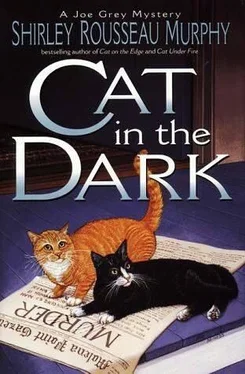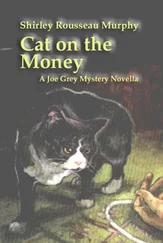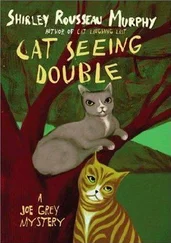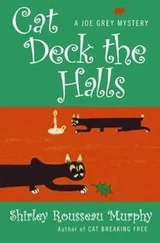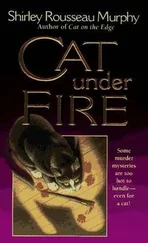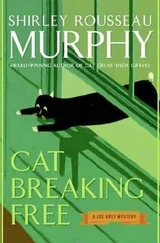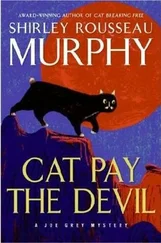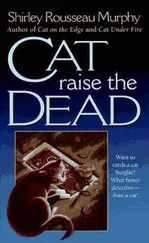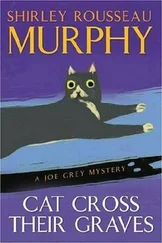"No one looked out the window before the children arrived?"
"Of course not. Why would we? Don't you listen? We had no reason to look out. The children's librarian was at her desk getting ready for story hour. This work takes a good deal of preliminary attention. My staff does not have time to dawdle, gawking out windows, Mr. McCoy."
"So you let the children run in there, without any supervision, and view a shocking and frightening death scene."
Dulcie smiled with appreciation. Danny was being totally unfair. Taunting Freda and shaping his own biased agenda. The article he was preparing to write would be scathing-he was going to cream Freda.
Purring and rolling over, she watched Joe slip in the front door and across the reading room behind the feet of several officers. He made one leap to a reading table, another to the top of the book stack, landed beside her with a soft thud, purring.
"Where's Mavity?" she whispered. "Did someone go to find her, to tell her about Dora and Ralph? Did they go to look for Greeley?"
"Harper sent an officer to find Mavity. I don't know about Greeley." And he settled down to watch Danny torment Freda, the young reporter playing her as skillfully as any cat baiting an angry rat.
"Exactly what degree of damage, Ms. Brackett, might this event have done to the children? Is it possible, would you say, that some of the children will need psychiatric help? Perhaps trauma counseling? Is the library insured for that kind of…"
"The city sees to our insurance, Mr. McCoy. I don't have time for this foolishness. If the children glimpsed a murder scene, that is no different from what they see on television."
Mrs. Truesdel moved closer to join them. "That is not what you told Captain Harper, Ms. Brackett. You said the children would probably need therapy. And as far as television," Mrs. Truesdel said, "I don't let my five-year-old watch violent TV. Nor do my friends. We try to protect our small children from undue violence. Certainly we don't expect them to witness two shocking deaths during story hour."
"This experience," Danny said, "will give them far worse nightmares then any TV show." He moved closer to Freda. "Certainly this ugly look at death has been far more harmful to the children than, say, finding a little cat in the library."
"Dead bodies, Mr. McCoy, seen through a window, cannot bite the children or communicate to them some life-threatening disease."
"I don't follow you. The library cat is healthy. What disease do you think she…"
"Rabies, Mr. McCoy. Lyme disease. Cat scratch fever-all of which can kill, if not treated. In the past year, in this county alone, there have been fifteen cases of rabies. And the statistics on Lyme disease…"
"But Dulcie has had her rabies shots. She has excellent veterinary care-she's not a diseased stray off the streets. And to my knowledge there have been no cases of Lyme disease in this coastal area."
"A cat's bite or scratch," Freda snapped, "is notoriously filthy."
"Has she ever bitten or scratched a child?"
"There is always the chance she will. Cats are half-wild creatures; they are never really domesticated."
Atop the book stack, Dulcie's eyes blazed. If ever she did yearn to bite and scratch, this was the moment. If ever she abandoned her domesticated ways, now was the time.
Beside her, Joe was nearly choking with laughter, his ears and whiskers twitching, his mouth open in a wide grin.
Soon Danny, having taken enough quotes from Freda for a scathing article, smiled sweetly at her, turned away, and approached three other mothers and their children. He was deep into conversation with them, writing down their comments, when another squad car pulled to the curb and an officer hurried up the path looking for Captain Harper, who stood just inside the door talking to the photographer.
"We didn't find Mavity Flowers," he told Harper. "She wasn't at home or at work up at Damen's apartments. And we haven't found Greeley Urzey."
Joe and Dulcie looked at each other. Dulcie whispered, "Has Greeley skipped? Did he do it?"
"No way, Dulcie. He…"Joe paused, scowling. "Here comes Clyde. He doesn't look too happy."
Hurrying up the walk, stepping over the yellow ribbon barrier and past the police guard, Clyde, like Danny, was disheveled and red-faced. Rushing in, nodding to Harper, he spotted Joe atop the book stack.
Sprinting across the room, he snatched Joe by the scruff of the neck and swung him down onto his shoulder, giving Joe a glare that would turn a Doberman to stone.
"Claws in," he hissed. "Put your claws in. And stay right there. Not a move. Not a snarl out of you."
Joe was shocked and hurt. What had he done? And he could say nothing. In public, he had no chance to defend himself.
Clyde looked up at Dulcie more gently. "Would you two like some breakfast?" He reached up for her. She gave him an innocent green gaze and slipped down willingly into his arms, soft and innocent, her claws hidden, her little cat smile so beatific Joe thought he'd throw up; he turned away from her, disgusted.
"It's time you two were out of here," Clyde said softly, meaning: Stay away from this! Leave it alone! Forget it. Carrying them out, Joe on his shoulder and Dulcie in his arms, he hurried around the block to his car and plunked them down in the ragged front seat. He was driving his latest acquisition, a battered '32 Ford that sounded like a spavined lawnmower. Starting the engine with a deafening clatter, he headed for Wilma's house.
When Clyde had sold his antique red Packard touring car to help pay for the apartment building, he'd started driving an old Mercedes he'd fixed up. The car was all right except for its color. Joe had refused to ride in the baby pink Mercedes. Clyde himself had taken all the ribbing he could stand, then sold the Mercedes and finished up the last details on the yellow '29 Chevy convertible in which he had escorted Charlie to the gallery opening. But then he'd picked up this Ford; he always had to have some old clunker to refurbish. Eventually he would turn it into a beauty, but meantime a ride in the heap was like being transported in a bucket of rattling tin cans. Driving to Wilma's, Clyde didn't speak to them. They crouched together hunched and cross as he parked at Wilma's curb.
She was on her hands and knees in the garden, transplanting gazanias, thinning out the low yellow flowers. As Clyde killed the rattling engine, the cats leaped out.
Wilma sat back on her heels, looking them over, her eyes widening with suspicion. "What?" she said. "What have they done now?"
Dulcie stared at her, hurt.
Joe didn't wait to hear Clyde's biased accusations. He shot past Wilma through the garden and around the house and up the hill at the back. To hell with humans.
Soon Dulcie came trotting along, looking chastened, and they took off up the hills to hunt-to let the atmosphere cool down.

CHARLIE WAS on a ladder painting the downstairs front bedroom when she saw Max Harper's police unit pull up out in front. As he came across the patio, something about his drawn look and the resigned set of his shoulders brought her down the ladder. Wiping her hands, she stepped to the open door.
Lieutenant Brennan had been up earlier looking for Mavity, but he wouldn't tell her why. She'd told him to try Mavity's cottage, that very likely Mavity had slept in, that she did that sometimes, that when she woke up she'd phone the apartments frantic and apologetic. But now, watching Harper, a chill held Charlie. His solemn expression made her stomach lurch.
She hadn't gotten to work herself until ten, had made a run around the coast to Hudson's Building Supply to pick up an order of some special tile and paint, some varnish, five gallons of mud, and some finishing nails. She'd had a cup of coffee with the owner, John Hudson, had helped him load her order then headed back. When she got to work, Mavity's VW wasn't parked in front, nor had Pearl Ann seen her.
Читать дальше
